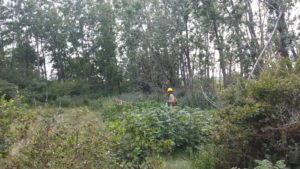This is the first of a series of blog posts (the environmental careers series) I will be doing about what people are doing with an environmental/geography degree from York University.
Aditi Gupta is a Junior Freshwater Biologist at the Department of Fisheries and Oceans. She graduated with a Bachelor in Environmental Studies (BES) in 2016. She also did her M.Sc in Geography in 2019.
Where do you work and what do you do?
I am a Junior Freshwater Biologist at the Department of Fisheries and Oceans (DFO). Right now, I am working on a team doing scientific research. I am actually working with data, with inputs to a model. Before this role, I have been a Policy Advisor and a Geographic Information Systems (GIS) analyst.
Tell us your work journey after the degree: what went well? What was challenging?
The job market now is based on contract work. It is tougher in Toronto than if you are willing or able to relocate to a remote area – for DFO, a coastal area – or Ottawa. The job market is challenging in many ways. I have seen jobs that require you to have a Master’s degree, GIS qualification – all for a wage of $16/hr. And if you have all of these qualifications and get to an interview, you might find prospective employers reluctant to hire you because they fear you will not stay in the job because you’re overqualified!
How did you use what you learned? When did you feel like “I wish that they had taught me about this in university!”
In my current job, I am using everything I learned in my Master’s degree, which was developing a model to acquire land for wildlife corridors based on habitat needs of specific species. I am on a team that is doing model development, and even though I’m only working on one aspect of the model – the inputs – I have an understanding of the big picture. My manager was excited because of that understanding.
As for what I wish I had learned, it would be a programming language. I have tasks that I would like to automate. Because of my GIS background I know where to look for solutions to GIS – I know how to ask the Internet a question about GIS. But I don’t have that level of knowledge with programming, and having seen what teammates can do with python or even with Excel macros, I wish I had done more of that.
Thinking back to when you were in high school, what made you want to get into this? How does what you are doing match, and differ, from what you thought?
I didn’t get a lot of career guidance at my high school. I looked around at what adults in my family were doing, and made a plan to go into education. I started in English. I loved wildlife, but the only career option I understood as a high school student was to be a veterinarian, which I didn’t want to do. I met people in Geography and was interested in what they were doing, so I switched into Environmental Studies and GIS, and have stayed there – now my job is GIS, wildlife conservation, and a bit of fieldwork, which I am trying to get into more.
Any other advice for people thinking of an undergrad environmental degree?
In the government, I find that they want you to have a Master’s degree or higher for science-based jobs. Technicians in the DFO have an incredibly high technical level in terms of their ability to identify fish, etc. The reason my resume would get looked at was because of my GIS background. I would say that you should volunteer, work with your professors – talk to professors you want to work with on summer research projects. I worked with Gail Fraser, and she made me feel confident in my abilities. Do placement courses, field courses. Don’t just think of getting a degree and get grouped in with everyone else. Put yourself out there. Marissa recently made me do my Naturalist Certification level 1 at the TRCA to keep learning.


